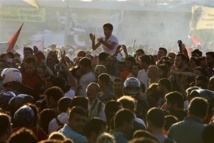Turkey artists demand an end to 'you vs us' rhetoric
Fulya Ozerkan
ANKARA, Fulya Ozerkan- Turkish artists, journalists and authors placed a full-page ad in several newspapers on Saturday, calling on the government to stop using divisive language they charge is polarising the country and stoking hatred.
The ad, signed by more than 80 people including Nobel literature laureate Orhan Pamuk, was published after a wave of often violent protests this month against Prime Minister Recep Tayyip Erdogan's government.

"There is an air of frustration and hatred around," it said, implicitly pointing the finger of blame at Erdogan and his Islamic-rooted government, accused of becoming increasingly authoritarian after a decade in office.
A defiant Erdogan has inflamed tensions by dismissing the demonstrators -- mostly young, middle class and well-educated -- as "looters" or naive youngsters who were being manipulated by "terrorists".
His fierce rhetoric has sharpened the divide between his supporters -- whom Erdogan hails as "the 50 percent" -- and secular segments of society, who have turned the tables on the catchphrase and dubbed themselves "the other 50 percent".
Journalists and members of the artistic community have been targeted by the Turkish authorities over the demonstrations, the most serious challenge to Erdogan's rule since his Justice and Development Party (AKP) took office in 2002.
One target of Erdogan's ire was prominent Turkish actor Mehmet Ali Alabora after he posted a tweet in a show of support for the protest movement.
Erdogan angrily accused him of stirring up unrest and threatened to press charges against him.
Alabora said earlier this month he had received unspecified threats after pro-government daily Yeni Safak branded him a leading figure in a "plot aimed at toppling the government".
Yeni Safak charged that a play directed by Alabora held several months of "revolution rehearsals" in Turkey ahead of the protests with the support of an unspecified "agency" in Britain.
The demonstrations, which claimed at least four lives and left thousands injured, have calmed down but the government's handling of the unrest has set off alarm bells over Ankara's commitment to freedom of expression and assembly.
Erdogan, who has branded the turmoil as a plot "hatched by traitors and their foreign accomplices", has repeatedly accused foreign media of wrongly portraying the mass protests, singling out CNN and the BBC.
A pro-government Turkish newspaper on Saturday said it had lodged a formal complaint against CNN International and its veteran anchor Christiane Amanpour for their "false" coverage of the protests.
"We filed a complaint Thursday against CNN and Amanpour on charges of inciting the public to hatred and enmity by making false news," said Takvim daily news director Mevlut Yuksel, who submitted the petition to an Istanbul prosecutor's office.
On Monday, the BBC expressed concern about a campaign by the Turkish authorities to "intimidate its journalists", while government officials have lashed out at international media outlets for their coverage of the unrest.
Ankara mayor Melih Gokcek has launched a Twitter campaign against BBC Turkish correspondent Selin Girit, accusing her of treason and spying for Britain.
Erdogan's regular attacks on the media and a tendency to use the courts to silence his enemies have added to concerns about rights in a country which has long sought to join the European Union.
Under his rule, Turkey has been blacklisted by rights groups as the leading jailer of journalists worldwide.
And fears are mounting that artists who joined the anti-government rallies will be banned from performing at festivals or staging plays in AKP-led municipalities.
World-renowned pianist Fazil Say was among the musicians to sign Saturday's advert.
The 43-year-old virtuoso is facing a retrial after a conviction for blasphemy over his Twitter posts was cancelled in April, a high-profile case that has irked secular Turks who are worried about what they see as creeping Islamic conservatism in the predominantly Muslim country.
Erdogan has won three succesive elections, gaining in popularity each time.
An opinion poll earlier this month found that the AKP would still come first if elections were held today, but only with 35.3 percent of the vote, compared with nearly half at the last ballot in 2011.
----------------------------------------------------------------------------------------------